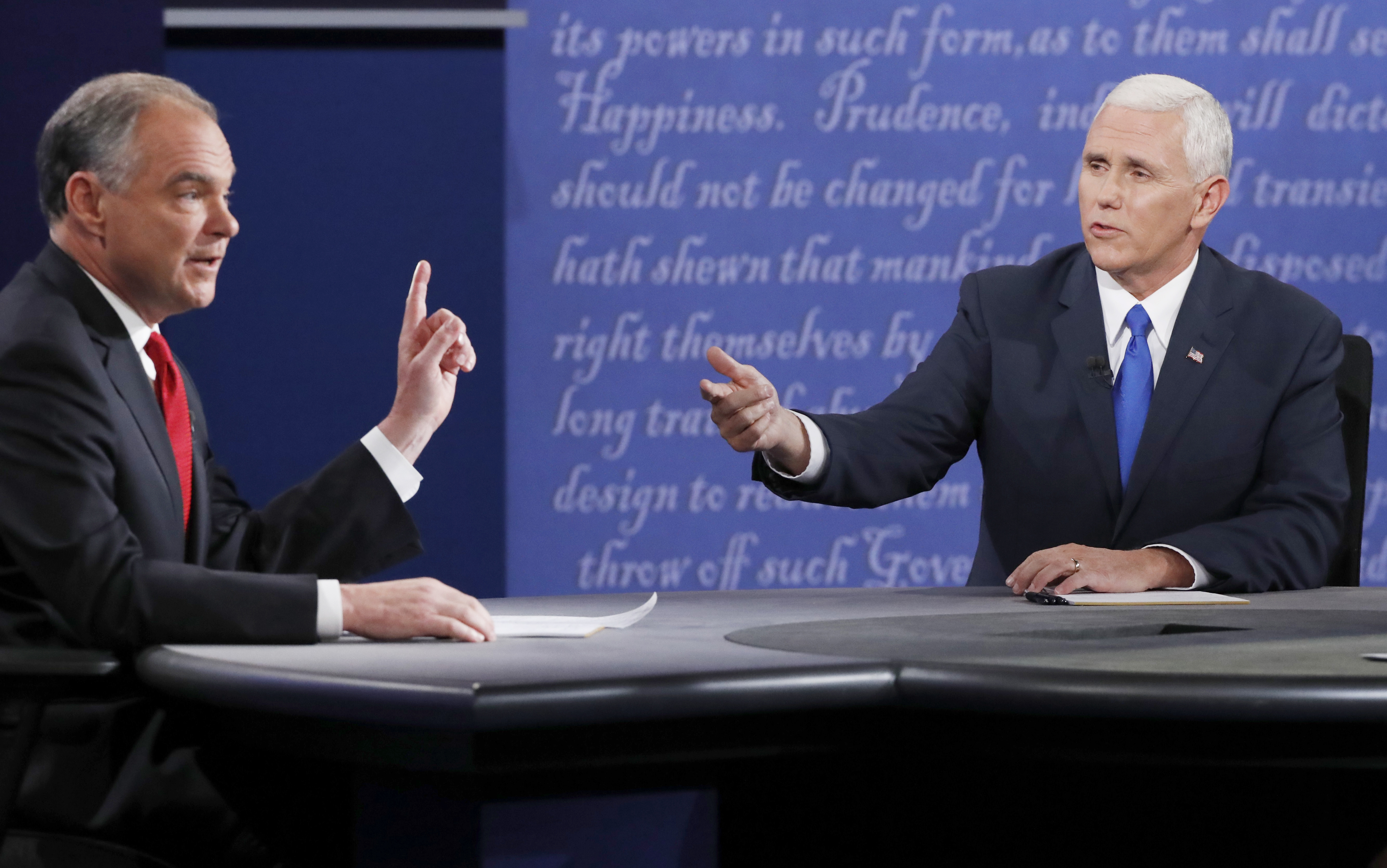Why the VP debate was all offense and no defense
Both VP candidates seemed intent on trashing their opponent's boss instead of defending their own


If you can count on a vice-presidential candidate for anything, it's going after the opposing side's presidential candidate. And at Tuesday's vice presidential debate in Virginia, Mike Pence and Tim Kaine did not disappoint on that score.
Despite a seesawing, unstable race, Donald Trump and Hillary Clinton remain two of the least popular nominees in American history. Suitably enough, their running mates determined to give up on defending them and attack, attack, attack.
Pence drew the shorter straw. It's a tall enough order to defend Trump on a day chosen at random; Pence had to weather criticism focused by Kaine's prep team around the latest and greatest of Trump gaffes. But weather it he did, wincing through the worst of what Kaine dished out with vaguely martyrish aplomb and pivoting to fire back with a surprising counterattack on Kaine's own remarkably hectic barrage. Kaine, Pence managed to show, had become more like Clinton since joining the ticket — overprepared, unwilling to admit fault, and so satisfied with his zingers that they often lost their zing.
The Week
Escape your echo chamber. Get the facts behind the news, plus analysis from multiple perspectives.

Sign up for The Week's Free Newsletters
From our morning news briefing to a weekly Good News Newsletter, get the best of The Week delivered directly to your inbox.
From our morning news briefing to a weekly Good News Newsletter, get the best of The Week delivered directly to your inbox.
Pence wasn't all tit for tat, though. Since it is a hopeless task to appeal to liberals on any of his core issues, he did his ticket the service of feeding some traditionalist red meat to Republicans Trump has left with that hollow feeling. Vladimir Putin? Bad. Very late-term abortion? Also bad! If it was enough to bring a sorely needed feeling of balance and predictability to the party's future — and of hope that Trump might just be a nightmare we'll all wake up from come November — it was also, creepily, enough to give conservatives a feeling of looking into a time capsule at what used to be their party.
There just wasn't any use in defending Trump on the merits, and Pence knew it. Lucky for him, Kaine came on so strong and so scripted that Pence could beg for mercy on grounds of common decency and, finally, sheer boredom.
Kaine's strategy — rub Trump in Pence's face, no matter the question or whose turn it was to answer — was certainly an irritating reminder of how Trump tends to cheapen politics as a whole. And Kaine also summoned forth another bothersome recollection: the teeth-gritting way Clinton tends to sour politics in the opposite manner from Trump. Trump is like a heckler who keeps forgetting his lines; she's like a bad insult comic who swallowed a See-N-Say. At a certain point, the two vectors of awfulness push so far across the spectrum they threaten to converge.
It almost seemed as if Team Clinton had treated Kaine like a private server, wiping him of his problematic nice-guy demeanor and replacing it with more favorable bulk emails loaded with choice rants. He was so hellbent on telling us what we already know — Trump is a boor — that he, Kaine, had turned into a boor by night's end.
A free daily email with the biggest news stories of the day – and the best features from TheWeek.com
So, advantage Pence — great news for Republicans, theoretically, but perhaps only in the diminished sense that Trump has brought to the word. In a superior world, Trump and Clinton would be jockeying for pole position at some tinseled gala while Pence and Kaine vied for the White House. But in an even better world, neither of these two blasts from an increasingly irretrievable political past would shoulder any of the burden of charting their parties' futures. Neither Pence nor Kaine shed much light on what is coming next for America, other than that it could be really bad. Tell us something we don't know.
James Poulos is a contributing editor at National Affairs and the author of The Art of Being Free, out January 17 from St. Martin's Press. He has written on freedom and the politics of the future for publications ranging from The Federalist to Foreign Policy and from Good to Vice. He fronts the band Night Years in Los Angeles, where he lives with his son.
-
 How climate change is affecting Christmas
How climate change is affecting ChristmasThe Explainer There may be a slim chance of future white Christmases
-
 The MAGA civil war takes center stage at the Turning Point USA conference
The MAGA civil war takes center stage at the Turning Point USA conferenceIN THE SPOTLIGHT ‘Americafest 2025’ was a who’s who of right-wing heavyweights eager to settle scores and lay claim to the future of MAGA
-
 The 8 best drama movies of 2025
The 8 best drama movies of 2025the week recommends Nuclear war, dictatorship and the summer of 2020 highlight the most important and memorable films of 2025
-
 Has Zohran Mamdani shown the Democrats how to win again?
Has Zohran Mamdani shown the Democrats how to win again?Today’s Big Question New York City mayoral election touted as victory for left-wing populists but moderate centrist wins elsewhere present more complex path for Democratic Party
-
 Millions turn out for anti-Trump ‘No Kings’ rallies
Millions turn out for anti-Trump ‘No Kings’ ralliesSpeed Read An estimated 7 million people participated, 2 million more than at the first ‘No Kings’ protest in June
-
 Ghislaine Maxwell: angling for a Trump pardon
Ghislaine Maxwell: angling for a Trump pardonTalking Point Convicted sex trafficker's testimony could shed new light on president's links to Jeffrey Epstein
-
 The last words and final moments of 40 presidents
The last words and final moments of 40 presidentsThe Explainer Some are eloquent quotes worthy of the holders of the highest office in the nation, and others... aren't
-
 The JFK files: the truth at last?
The JFK files: the truth at last?In The Spotlight More than 64,000 previously classified documents relating the 1963 assassination of John F. Kennedy have been released by the Trump administration
-
 'Seriously, not literally': how should the world take Donald Trump?
'Seriously, not literally': how should the world take Donald Trump?Today's big question White House rhetoric and reality look likely to become increasingly blurred
-
 Will Trump's 'madman' strategy pay off?
Will Trump's 'madman' strategy pay off?Today's Big Question Incoming US president likes to seem unpredictable but, this time round, world leaders could be wise to his playbook
-
 Democrats vs. Republicans: who are US billionaires backing?
Democrats vs. Republicans: who are US billionaires backing?The Explainer Younger tech titans join 'boys' club throwing money and support' behind President Trump, while older plutocrats quietly rebuke new administration
